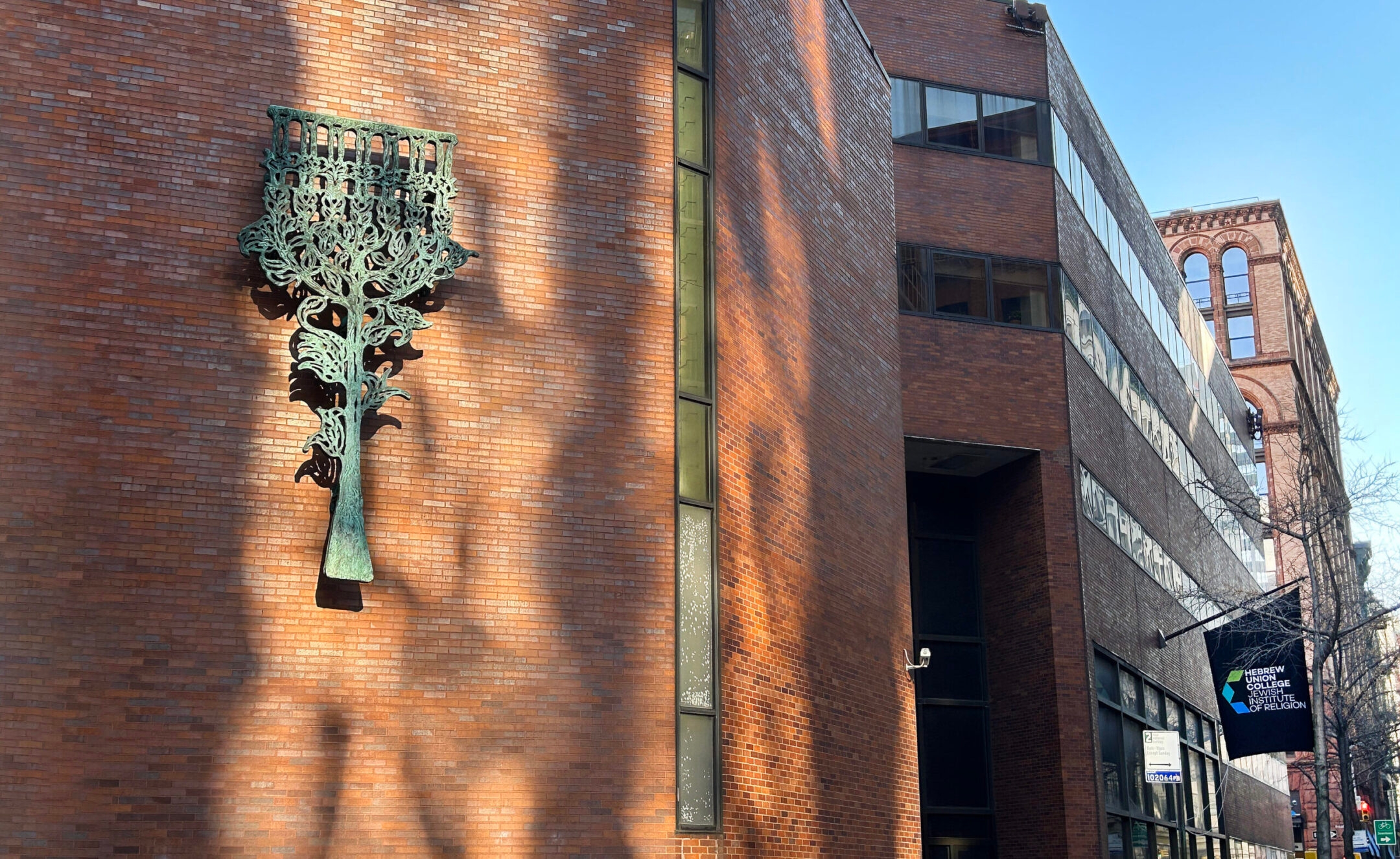Short on students, Reform Judaism’s seminary introduces remote ordination program
Hebrew Union College-Jewish Institute of Religion will keep its requirement of study in Israel

Hebrew Union College-Jewish Institute of Religion’s main campus in New York City. Photo by Plexi Images/GHI/UCG/Universal Images Group via Getty Images
Hebrew Union College-Jewish Institute of Religion, the flagship rabbinical school of Reform Judaism, will allow students to pursue ordination remotely, the school announced Tuesday, part of a program overhaul that aims to reverse plummeting enrollment.
Beginning in 2025, HUC will offer two ordination tracks — one based at its New York and Los Angeles campuses, the other virtual — with the virtual cohort taking fewer courses per term and meeting year-round.
The school will also allow certain students to graduate in less than its previously required five years.
“There are people throughout the country who feel called to become rabbis and would like to come to HUC, but can’t move to a campus city or commute to a campus city,” said Rabbi Andrea Weiss. “This is not a separate program, but the same curriculum, same learning outcomes, but a different way to achieve it.”
Coming on the heels of the school’s controversial decision last month to begin admitting and ordaining rabbinical students in interfaith relationships, the overhaul was also notable for what went unchanged: the requirement that students study in Israel.
Founded in 1875, HUC is one of several mainstream non-Orthodox Jewish seminaries that have seen their enrollments decline in the last 15 years. HUC’s enrollment in its ordination program was 194 in 2008; it’s currently at 114. Under financial pressure, the school voted to sunset the ordination program at its Cincinnati campus in April 2022. That summer, Weiss said, a pair of faculty members began reshaping the curriculum.
HUC’s decision makes it the largest Jewish seminary to offer a virtual path to ordination, joining Yeshivat Chovevei Torah, a progressive Orthodox rabbinical school, its sister school Yeshivat Maharat, which ordains women, and the Academy of Jewish Religion, which is nondenominational.
Long-distance ordination
Weiss said the school decided to put remote learners on a separate track entirely because of a lesson it learned during the pandemic: hybrid learning is the least effective format.
Remote students will have the same faculty as the on-campus learners, Weiss said, but they won’t always be watching them live — some classes will be recorded for watching at their convenience. And while on-campus learners take their summer break, the virtual group will shoulder a courseload similar to their spring and fall terms.

The school has also rebuilt the curriculum around a mix of semester-long courses and elective offerings that can be as short as two days.
The school still wants the two cohorts to learn with and from each other. So the virtual track will convene at one of the three campuses at the start of each semester, Weiss said, and the cohorts will mix on school-led trips. The tuition, about $28,000 per year, would be roughly the same, just split across three semesters rather than two, she added.
HUC will also allow students with postgraduate degrees in Jewish areas — like cantorial school graduates — to transfer in credits and reduce their time in school by as much as two years.
Weiss hopes these changes appeal to established Jewish community professionals considering ordination either as a path to a career change, or a tool to enhance the work they already do.
While the virtual track caters to “second-career” applicants, it’s open to everyone, Weiss said. She said the school is targeting a spring 2025 enrollment of up to 12 students in the virtual track — nearly equal to its entering rabbinical school class of 14 this coming fall.
Expanding ordination to a more diverse group of candidates — both in professional background and geographically — will create a rabbinate better equipped to serve a Jewish community that is increasingly detached from the synagogue, Weiss said.
“In the past, it was much more of a focus on congregational work,” she said. “Now there’s a recognition that the rabbinate is much more diverse in terms of the kinds of places that rabbis serve. It’s both ‘Where are rabbis?’ and ‘Where are Jews?’”
Sticking with Israel
The school’s Jerusalem campus — which is also the headquarters of the Reform movement in Israel — has been where first-year HUC rabbinical students have studied since 1970, and in 2016 it was rededicated as part of a $15 million renovation.
As debates around Israel post-Oct. 7 roil Reform Judaism, a movement historically at the forefront of American Jewish liberal politics, HUC called studying there “foundational” to its program in Tuesday’s news release.
Weiss said students on the virtual track would share the on-campus cohort’s requirement of two semesters in Israel, but unlike their counterparts, they would not have to go for their first year. And prior study or volunteering in Israel — she offered an undergraduate semester abroad as an example — could reduce students’ requirement from the standard full year.
Weiss recognized that the requirement might turn off some prospective students from HUC. But she said attachment to Israel would also be the reason others chose it.
“Students who want to come to HUC know that Israel is a key part of our program,” she said. “I think for people who don’t want to spend a year in Israel or the equivalent thereof, they have other options.”
















